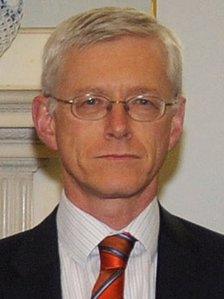UK recovery to take five years, says MPC's Martin Weale
- Published

Martin Weale said more easing would come once it had become clear that inflation was on a downward trend
The UK economy will take five-and-a-half years to recover to its pre-recession level, a Bank of England Monetary Policy Committee member says.
Martin Weale called the recovery "unusually slow" and signalled more quantitative easing - creating money to buy government debt - may be coming.
In a speech, he said the downturn is the longest by a year of six recessions since the 1920s, external.
The Bank expects output in the UK to return to its 2008 level only by 2013.
More easing
Speaking to the National Institute of Social and Economic Research, Mr Weale, who is an external member of the Bank's nine-strong policymaking Monetary Policy Committee (MPC), said there was a strong case for more quantitative easing, as long as inflation was falling.
The Bank is currently engaged in a £275bn programme of UK government debt purchases - something that is expected to come to an end in February next year.
It is designed to put more cash into the UK financial system, to reduce long-term borrowing costs, and to push up the value of assets such as shares and house prices.
Mr Weale said that he hoped the programme would add 0.5% to economic output.
But, he said if that did not happen, the MPC should be cautious ahead of further action: "It might be prudent to wait to see that the sharp fall in the inflation rate which we have been forecasting actually happens before making any further decisions.
"But nevertheless, unless the economic situation improves, there is likely to be a strong case for extending the asset purchase programme after the current one comes to an end."
He added that the UK needed to rebalance towards a more productive, export-led economy - but this was largely out of the Bank's control, and would be easier when the economy was growing more strongly.
Mr Weale's comments reinforce the impression that the MPC is highly likely to enact more quantitative easing, according to Howard Archer, the chief UK and European economist at Global Insight.
"[It will come] early in 2012, as long as there is evidence to support the view that consumer price inflation is headed down markedly, as expected," said Mr Archer.
Earlier this week, the Bank of England released the latest set of minutes from the MPC's November meeting.
It said the danger for the UK from the eurozone crisis has risen but that now was not the time to add further stimulus to the economy.
All nine members of the MPC backed maintaining the target level of quantitative easing at £275bn.
They also unanimously agreed to keep interest rates at 0.5%.